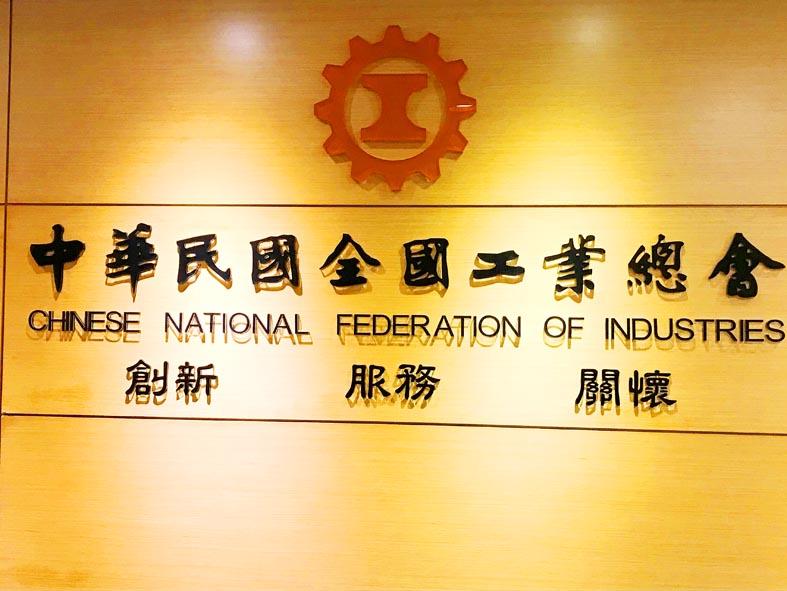The government should help local firms boost competitiveness, while building Taiwan into a hub for high-end technology patents, research and development, and corporate operating facilities, a trade group said in a paper released yesterday.
The Chinese National Federation of Industries’ (CNFI, 全國工業總會) annual position paper said that the COVID-19 pandemic challenges globalization and realigns electronics supply chains, which would benefit Taiwan and bolster its importance on the world stage, it said.
The group, which consists of 159 associations and represents a majority of local manufacturing firms, said the government should monitor an imbalance in growth between large corporations and small and medium-sized enterprises.

Photo: Lee Ya-wen, Taipei Times
Large corporations can help smaller businesses expand in the US and European markets, and create clusters that can benefit all, the paper said, adding that overconcentration in a few sectors would deepen the imbalance and be unfavorable for talent recruitment, the development of renewable energy sources and other economic issues.
Petrochemical and metal manufacturers, for instance, could pursue digital transformation, aided by artificial intelligence and Internet of Things solutions, it said.
Policymakers can support the process by offering favorable tax rates and other incentives to encourage industrial upgrades and innovation.
The government should also adopt forward-looking positions to tackle issues linked to climate change in light of the nation’s worst water shortage in 50 years in the first half of this year, it added.
A stable water supply is crucial for chipmakers and other manufacturers, it said, adding that the manufacturing industry accounts for only 10 percent of Taiwan’s water usage.
The government should also take bold steps to make water management policies supported by scientific feasibility, it said.
The trade group said that Taiwan should be pragmatic and equally cordial in its dealings with the US and China as the world’s two largest economies cut economic dependence on each other.
Electronics shipments to China last year amounted to US$63.5 billion, greater than the US$47 billion in shipments destined to the US, the group said.
Although China-bound investment declined, local firms based in the Chinese market grew more profitable, meriting the need to pursue cross-strait peace, it said.
The government must also take quick and effective action to address the nation’s low fertility rate, which would soon evolve into a national security problem after the number of deaths surpassed births last year, it said.
The trend is worrying, as financial burdens are growing for middle-aged people who have to raise children while caring for their ailing parents, it added.

Three experts in the high technology industry have said that US President Donald Trump’s pledge to impose higher tariffs on Taiwanese semiconductors is part of an effort to force Taiwan Semiconductor Manufacturing Co (TSMC, 台積電) to the negotiating table. In a speech to Republicans on Jan. 27, Trump said he intends to impose tariffs on Taiwan to bring chip production to the US. “The incentive is going to be they’re not going to want to pay a 25, 50 or even a 100 percent tax,” he said. Darson Chiu (邱達生), an economics professor at Taichung-based Tunghai University and director-general of

Hon Hai Precision Industry Co (鴻海精密) is reportedly making another pass at Nissan Motor Co, as the Japanese automaker's tie-up with Honda Motor Co falls apart. Nissan shares rose as much as 6 percent after Taiwan’s Central News Agency reported that Hon Hai chairman Young Liu (劉揚偉) instructed former Nissan executive Jun Seki to connect with French carmaker Renault SA, which holds about 36 percent of Nissan’s stock. Hon Hai, the Taiwanese iPhone-maker also known as Foxconn Technology Group (富士康科技集團), was exploring an investment or buyout of Nissan last year, but backed off in December after the Japanese carmaker penned a deal

WASHINGTON POLICY: Tariffs of 10 percent or more and other new costs are tipped to hit shipments of small parcels, cutting export growth by 1.3 percentage points The decision by US President Donald Trump to ban Chinese companies from using a US tariff loophole would hit tens of billions of dollars of trade and reduce China’s economic growth this year, according to new estimates by economists at Nomura Holdings Inc. According to Nomura’s estimates, last year companies such as Shein (希音) and PDD Holdings Inc’s (拼多多控股) Temu shipped US$46 billion of small parcels to the US to take advantage of the rule that allows items with a declared value under US$800 to enter the US tariff-free. Tariffs of 10 percent or more and other new costs would slash such

SENSOR BUSINESS: The Taiwanese company said that a public tender offer would begin on May 7 through its wholly owned subsidiary Yageo Electronics Japan Yageo Corp (國巨), one of the world’s top three suppliers of passive components, yesterday said it is to launch a tender offer to fully acquire Japan’s Shibaura Electronics Co for up to ¥65.57 billion (US$429.37 million), with an aim to expand its sensor business. The tender offer would be a crucial step for the company to expand its sensor business, Yageo said. Shibaura Electronics is the world’s largest supplier of thermistors, with a market share of 13 percent, research conducted in 2022 by the Japanese firm showed. If a deal goes ahead, it would be the second acquisition of a sensor business since